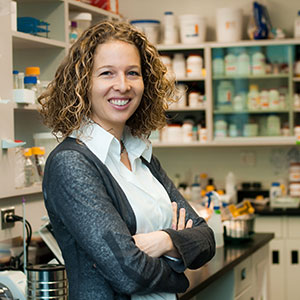You want to move the needle on global knowledge surrounding human nutrition — and move human wellbeing forward while you’re at it. UBC’s graduate programs in Human Nutrition offer opportunities for you to conduct advanced study and original investigations in basic and applied human nutrition. From bone loss in men who are being treated for prostate cancer to reexamining vitamin D supplementation in newborns, UBC’s original research pushes the planet’s understanding of human nutrition to new levels.
PhD: Human Nutrition – Doctor of Philosophy – Postgraduate / Graduate Degree Program – UBC Grad School
MSc: Human Nutrition – Master of Science – Postgraduate / Graduate Degree Program – UBC Grad School
What you need to know
In the lab and in the field, you’ll be deepening your contribution to current knowledge and practice, studying nutrient metabolism, diet and disease, nutrition through the life cycle and human nutrition behaviours.
Our graduate degree programs in Human Nutrition are enriched through collaboration with colleagues in other UBC graduate programs, including Animal Science, Food Science, Pediatrics, Anatomy and Cell Biology, and Pharmaceutical Sciences.
The graduate program in Human Nutrition offers opportunities for advanced study and original investigations in basic and applied human nutrition at both the master’s and doctoral levels. The curriculum includes coursework and thesis research through laboratory or field work in a variety of areas relevant to human nutrition including nutrient metabolism, diet and disease, nutrition through the life cycle and nutrition behaviours.
Research projects also examine environmental, social, and individual determinants of food choices and eating patterns; this includes better understanding of sociocultural effects on diet, and the impact living in “food deserts” can have on good health.
International nutrition projects in Cambodia, Zambia, Rwanda and other countries seek to improve maternal, infant and child nutrition.
MSc
For admission with full standing into the MSc program, applicants from a Canadian or American university or college must hold a bachelor degree or its academic equivalent with a minimum overall average in the B+ range (at UBC 76% or higher) in all third- and fourth-year courses. Minimum academic requirements for students from other countries are specified on the Faculty of Graduate and Postdoctoral Studies web site.
For students whose degree was not completed in English, minimum TOEFL scores are 577 (paper version), 233 (computer version), or 90 (Internet version); or IELTS score of 6.5 with no band less than 6.
Students admitted to the MSc program must meet the Faculty of Graduate and Postdoctoral Studies’ master’s degree admission requirements.
In addition, required prerequisite courses include biochemistry, human or vertebrate physiology and advanced nutrition. A minimum of 3 credits (three hours per week, for two academic terms or one academic year) is required in each of biochemistry and physiology, and a minimum of 12 credits is required in nutrition. These prerequisite courses must be completed at the third- or fourth-year level. Students without a background in nutrition, or with fewer than 12 credits of undergraduate courses in nutrition, may apply to the program. However, if admitted, they will be required to take the missing credits of third- or fourth-year nutrition courses early in the graduate program, in addition to the usual MSc course requirements.
PhD
Applicants for the PhD degree must ordinarily hold a first-class master’s degree in nutrition with a standing of “A”, and a bachelor’s degree with the above academic standing in nutrition or a related science. For students whose degree was not completed in English, minimum TOEFL scores are 577 (paper version), 233 (computer version), or 90 (Internet version); or IELTS score of 6.5 with no band less than 6.
Students are not normally admitted directly into the PhD program from a bachelor’s program. However, highly qualified students may transfer to the PhD program without completing a MSc thesis. Click here for additional information about transferring programs.
MSc
The MSc program requires completion of a minimum of 30 credits, including an 18-credit research thesis and at least 12 credits of coursework. With an 18-credit thesis, students can include a maximum of 3 credits of senior undergraduate courses.
HUNU 500, 531 and at least one other 500-level HUNU graduate course are required of all students in the MSc program.
A student’s supervisory committee may require more than the minimum credits.
PhD
The PhD program requires completion of HUNU 500 and HUNU 631. Additional coursework will be selected in consultation with the student’s supervisory committee. All doctoral students are required to successfully complete a comprehensive examination. The major requirement for the PhD is completion of a research dissertation that meets the Faculty of Graduate and Postdoctoral Studies requirements.
Faculty Members

Michael Zulyniak
Associate Professor, Food, Nutrition and Health

Tamara Cohen
Director of Dietetics Programs
Associate Dean, Students and EDI
Associate Professor, Food, Nutrition and Health

Rajavel Elango
Associate Member, Human Nutrition
Associate Professor, School of Population and Public Health

Annalijn Conklin
Associate Member, Human Nutrition
Associate Professor, Faculty of Pharmaceutical Sciences

Angela Devlin
Associate Member, Human Nutrition
Associate Professor, Division of Endocrinology, Department of Pediatrics

Rachel Murphy
Associate Member, Human Nutrition
Assistant Professor, School of Population and Public Health

Mahsa Jessri
Associate Professor, Food, Nutrition and Health
Centre for Health Services and Policy Research (CHSPR)
Canada Research Chair (Tier 2) in Nutritional Epidemiology for Population Health

Barbara Stefanska
Associate Professor, Food, Nutrition and Health

Yvonne Lamers
Associate Professor, Food, Nutrition and Health

Crystal Karakochuk
Associate Professor, Food, Nutrition and Health
Canada Research Chair (Tier 2) in Micronutrients and Human Health

Jennifer Black
Associate Professor, Food, Nutrition and Health

Zhaoming Xu
Associate Professor, Food, Nutrition and Health
Facilities
| Clinical Nutrition Lab | Clinical Research Facility | Vij’s Kitchen Culinary Lab | Sensory Labs |
Collaborations
The program is enriched through collaboration with colleagues in graduate programs such as Applied Animal Biology, Food Science, Pharmaceutical Sciences, Medicine, Health Care and Epidemiology, Human Kinetics, and the Institute for Health Promotion Research.
Got Questions?
Whether you’ve got questions about your program, your experience or your next steps, Graduate Student Services is here to help. Get in touch.
Where Can a Graduate Degree in Human Nutrition Take You?
Graduates of the MSc and PhD in Human Nutrition have gone on to pursue:
- academic positions at universities or colleges;
- work in consulting;
- careers in health-related fields including medicine and dentistry.
- Students who were registered dietitians before pursuing graduate study have gone on to senior clinical or administrative positions.
Research Updates
Is eating a mixed diet better for health and survival?
An analysis of 20 longitudinal studies looking at the link between dietary diversity and chronic disease impacts.
